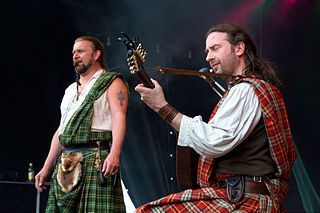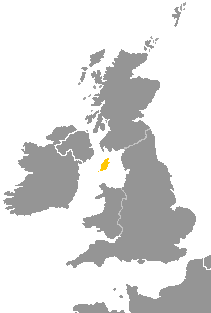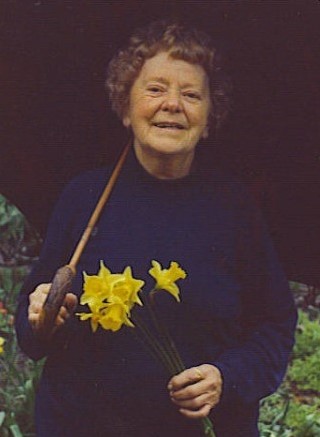
Celtic music is a broad grouping of music genres that evolved out of the folk music traditions of the Celtic people of Northwestern Europe. It refers to both orally-transmitted traditional music and recorded music and the styles vary considerably to include everything from traditional music to a wide range of hybrids.

The Isle of Man or Mann, is a self-governing British Crown Dependency in the Irish Sea, between Great Britain and Ireland. It is recognised as one of the Celtic nations and is the homeland of the Manx people, a Celtic ethnic group. As head of state, Charles III holds the title Lord of Mann and is represented by a Lieutenant Governor. The government of the United Kingdom is responsible for the Isle of Man's military defence and represents it abroad, but the Isle of Man still has a separate international identity.

Manx, also known as Manx Gaelic, is a Gaelic language of the insular Celtic branch of the Celtic language family, itself a branch of the Indo-European language family. Manx is the historical language of the Manx people.

The music of the Isle of Man reflects Celtic, Norse and other influences, including those from its neighbours, Scotland, Ireland, England and Wales. The Isle of Man is a small island nation in the Irish Sea, between Great Britain and Ireland.

Yn Chruinnaght is a cultural festival in the Isle of Man which celebrates Manx music, Manx language and culture, and links with other Celtic cultures.

The culture of the Isle of Man is influenced by its Celtic and, to a lesser extent, its Norse origins, though its close proximity to the United Kingdom, popularity as a UK tourist destination, and recent mass immigration by British migrant workers has meant that British influence has been dominant since the Revestment period. Recent revival campaigns have attempted to preserve the surviving vestiges of Manx culture after a long period of Anglicisation, and significant interest in the Manx language, history and musical tradition has been the result.

Literature in the Manx language, which shares common roots with the Gaelic literature and Pre-Christian mythology of Ireland and Scotland, is known from at least the early 16th century, when the majority of the population still belonged to the Catholic Church in the Isle of Man.

The Manx are an ethnic group originating on the Isle of Man, in the Irish Sea in Northern Europe. They belong to the diaspora of the Gaelic ethnolinguistic group, which now populate the parts of the British Isles and Ireland which once were the Kingdom of the Isles and Dál Riata. The Manx are governed through the Tynwald, the legislature of the island, which was introduced by Viking settlers over a thousand years ago. The native mythology and folklores of the Manx belong to the overall Celtic Mythology group, with Manannán mac Lir, the Mooinjer veggey, Buggane, Lhiannan-Shee, Ben-Varrey and the Moddey Dhoo being prominent mythological figures on the island. Their language, Manx Gaelic is derived from Middle Irish, which was introduced by settlers that colonised the island from Gaelic Ireland. However, Manx gaelic later developed in isolation and belongs as a separate Goidelic language of the Insular Celtic languages.

Hop-tu-Naa is a Celtic festival celebrated in the Isle of Man on 31 October. It is the celebration of the traditional Gaelic festival of Samhain, the start of winter. It is thought to be the oldest unbroken tradition in the Isle of Man.

Julie Fowlis is a Scottish folk singer and multi-instrumentalist who sings primarily in Scottish Gaelic.

Lori Watson is a fiddle player and folk singer who performs traditional and contemporary folk music. She is the first doctor of Artistic Research in Scottish Music.

Rachel Hair is a folk harpist from Scotland. She plays the Celtic harp, also known by the Scottish Gaelic word clarsach.

Mona Douglas was a Manx cultural activist, folklorist, poet, novelist and journalist. She is recognised as the main driving force behind the modern revival of Manx culture and is acknowledged as the most influential Manx poet of the 20th century, but she is best known for her often controversial work to preserve and revive traditional Manx folk music and dance. She was involved in a great number of initiatives to revive interest and activity in Manx culture, including societies, classes, publications and youth groups. The most notable and successful of these was Yn Chruinnaght.
Aeglagh Vannin was a youth group in the Isle of Man whose purpose was the engagement with and revitalisation of Manx language, history and culture. It was established by Mona Douglas in 1931, went through a number of mutations, and faded out in the 1970s. It is best remembered for its central role in the revival of Manx folk dancing.

Culture Vannin is the trading name for the Manx Heritage Foundation, established in 1982 by the Isle of Man Government to promote Manx culture, heritage and language. It was rebranded in February 2014, having previously been known as the "Manx Heritage Foundation", since the former title "held connotations more towards the cultural history of the island" which were not felt to be accurate to the organisation's progressive approach to invigorating Manx culture. Culture Vannin's motto is "Taking our culture forward".

Colin Jerry was a Manx cultural activist best known for his contributions to Manx music through his books, Kiaull yn Theay, published in two volumes. He was awarded the Reih Bleeaney Vanannan in 1991 for his contributions to Manx culture which were 'extensive and staggering.'

Barrule was a Celtic and folk trio from the Isle of Man. The band's three members were: Tomas Callister (fiddle), Jamie Smith (accordion) and Adam Rhodes (bouzouki). Barrule's discography included both original and traditional Manx language songs.

Solace in Wicca is a 2013 Manx-produced short biographical horror drama film about the 1617 execution of Margaret Quaine and her son Robert, the only executions for witchcraft recorded on the Isle of Man and one of the last witchcraft executions to be sanctioned by the Church of England in the British Isles.
Doug Fargher (1926–1987) also known as Doolish y Karagher or Yn Breagagh, was a Manx language activist, author, and radio personality who was involved with the revival of the Manx language on the Isle of Man in the 20th century. He is best known for his English-Manx Dictionary (1979), the first modern dictionary for the Manx language. Fargher was involved in the promotion of Manx language, culture and nationalist politics throughout his life.
Isla Callister, also Isla Callister-Wafer, is a folk musician and fiddle player from the Isle of Man. She is a member of the all-women folk group Heisk, and the band Trip. She performed with both ensembles at Celtic Connections in 2024. Trip were nominated for the BBC Folk Awards Young Folk Award in 2018.














